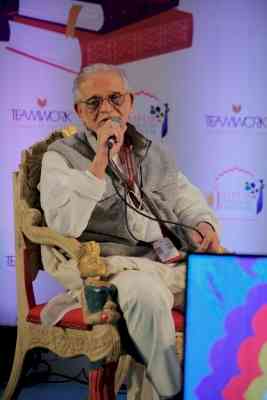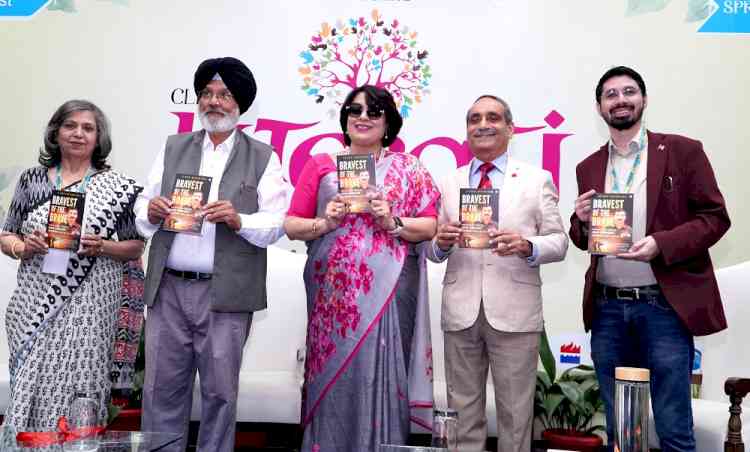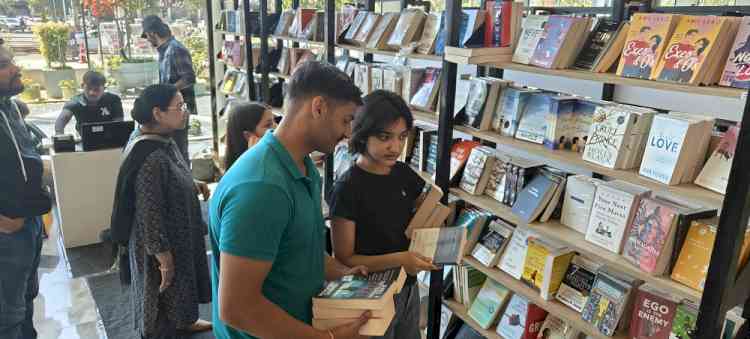JLF Day 3: Authors, experts from diverse fields share a whole gamut of ideas
The third day of the 16th edition of Jaipur Literature Festival featured a gamut of ideas which were shared by renowned authors and veterans from diverse fields.

Jaipur, Jan 21 (IANS) The third day of the 16th edition of Jaipur Literature Festival featured a gamut of ideas which were shared by renowned authors and veterans from diverse fields.
Booker Prize winner Geetanjali Shree, well-known Rajasthani and Hindi writer Nand Bhardwaj, Sahitya Akademi Award recipient novelist Anamika, MD and CEO of Bank of Baroda Sanjiv Chadha, and author-translator and columnist Pushpesh Pant focused on the diversity of Hindi and the difficulty of 'purifying' it.
They discussed how the different variants of Hindi across India get embedded in languages across the subcontinent, resulting in a Kolkata Hindi, Mumbai Hindi etc.
Sharing her thoughts, Shree noted, "I feel that language can never have a strict boundary, and it never should. The people who are drawing such strict boundaries are, in the name of purifying them, segregating them."
Archaeologists David Wengrow and Rebecca Sykes talked about primitive ancestors, barbarism, human instinct, the origin of states and civilisations and their ties to the conflict between European society and indigenous discourse. In their book, authors of 'The Dawn of Everything', Wengrow and the late David Graeber, provide an extraordinary perspective of human history and social evolution, challenging our most fundamental assumptions to reveal a broader scope for human emancipation.
Author Deepti Kapoor in conversation with Man Booker Prize winner Marlon James talked about her latest book 'Age of Vice' and the inspiration behind her writing. On speaking of writing a crime novel, Kapoor said, "...In order to create something larger and stranger... and unstable, I think instability is a really important word to me, instability in an unstable world that reflects the current time we're living in..."
Internationally acclaimed artist and writer Edmund de Waal was in conversation with writer and oral historian Aanchal Malhotra. They discussed Waal's recent works -- 'The Hare with Amber Eyes' and 'Letters to Camondo'.
The first book paints a moving picture of his family's history in Nazi-occupied Vienna and their migration to Japan due to political reasons. Inheriting his family's exquisite collection of 264 tiny Japanese wood and ivory carvings, called netsuke, Waal decided to trace their strange history and in turn unravelled the roots of his Jewish heritage.
At the launch of award-winning poet Ranjit Hoskote's 'Icelight', Hoskote was in conversation with the Creative Director of Oijo Media and co-founder of the Indian History Collective, Pragya Tiwari, reading poems from the book. During the launch, Hoskote spoke about the deepening current ecological crisis and how various species have been brought to extinction.
In another discussion, Professor of Artificial Intelligence at UNSW Sydney Toby Walsh, President and Chief Executive of the Centre for Policy Research Yamini Aiyar, Simonyi Professor for the Public Understanding of Science and Professor of Mathematics at the University of Oxford Marcus du Sautoy and CEO of cult.fit and Founder of Myntra Mukesh Bansal, were in conversation with former diplomat Navtej Sarna.
An expert panel consisting of renowned journalists Praveen Swami, Manoj Joshi, and Nishtha Gautam were in conversation with author C Raja Mohan, to discuss 'In Hard Times', an important collection of essays edited by them, highlighting the significant challenges India faces today.
At another book launch, celebrated poet, author, music and cinema scholar Yatindra Mishra and one of India's most respected scriptwriters, directors, and leading poets Gulzar, were in conversation with celebrated author and screenwriter Anu Singh Choudhary which focused on Mishra's new book, 'Lata Mangeshkar: A Life in Music'. This panel of speakers discussed the making of the book and the limitations of using English as the sole language of writing it.
The decision to write the book in Hindi and then translate it to English was also informed by the different readerships that both languages attract. Speaking about his interactions with Lata Mangeshkar, Gulzar sahab said, "If there are two creative minds, they can't be parallel lines, they have to cross each other."
Anti-caste activist, poet, novelist, and translator Meena Kandasamy was in conversation with award-winning writer Manasi Subramaniam, discussing 2,000-year-old text, Tirukkural. During the session, Kandasamy also spoke about the importance of Tirukkural in Tamil culture and also its anti-caste identity that counters the Manusmriti. The discussion was centred around the significance of female intervention in the translation of ancient texts.


 IANS
IANS 







